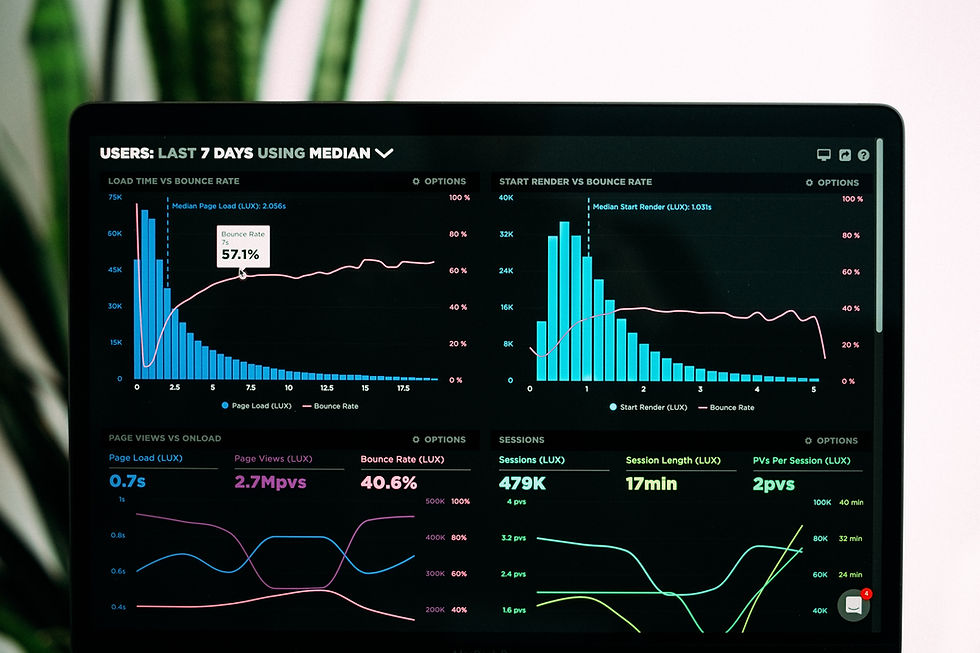How Automation Can Revolutionize Your Company’s Reporting Tools
- Joe Harari
- Sep 23, 2024
- 3 min read

In today’s fast-paced business world, data is everything. It drives decision-making, highlights growth opportunities, and allows businesses to stay ahead of the competition. But what happens when your reporting tools, the very systems designed to organize and deliver that valuable data, become a bottleneck? This is where automation steps in—and its impact can be transformative.
Here’s how automating your company’s reporting tools can change the game:
1. Faster, Real-Time Insights
Manual reporting often involves pulling data from various sources, compiling it into spreadsheets, and running analyses that take days—or even weeks. Automation removes the need for manual labor. By integrating your data sources into a single system and using automation to pull the data, your reports can be generated in real-time. You no longer have to wait until the end of the quarter to know how your company is performing; with automated reports, you can monitor KPIs daily or even hourly, gaining timely insights that lead to quicker and more informed decisions.
2. Improved Accuracy and Reduced Human Error
When people manually compile data, mistakes are inevitable. From input errors to outdated formulas, a lot can go wrong in a manual reporting process. Automating your reporting systems minimizes the risk of human error. Automation tools pull data directly from the source and apply consistent logic and formulas to the analysis. This ensures that your reports are accurate and consistent, giving your leadership team reliable data they can trust.
3. Enhanced Customization
Reporting needs often vary across departments. What the sales team needs is different from what finance or marketing requires. Automated reporting systems can be set up to create customized dashboards and reports for each department without requiring separate manual inputs each time. Team members can get a tailored view of the data that matters most to them, while you, as a leader, can monitor performance across the entire company with a click.
4. Scalability
As your company grows, the volume of data will expand exponentially. What may have worked with spreadsheets or basic reporting tools when you had 50 employees might crumble under the weight of a 500-person operation. Automated reporting tools can easily scale with your business. Whether your data sources multiply, or you introduce new metrics to track, automation ensures your reporting system can grow without increasing manual workloads or slowing down processes.
5. Cost Savings and Efficiency
Time is money, and manual reporting takes a lot of both. When your team spends hours—sometimes even days—building reports, they’re not working on other essential tasks. Automation eliminates this inefficiency. Automated systems can generate reports in seconds, freeing up your employees to focus on high-value activities like analyzing data trends, problem-solving, and strategic planning. The result? Higher productivity and reduced labor costs.
6. Greater Data Transparency and Collaboration
Automated reporting tools create a single source of truth for your data. This transparency ensures everyone across your organization is working from the same data set, reducing miscommunications and conflicting interpretations of performance. Many automation tools also allow for easy sharing and collaboration on reports, enabling teams to collaborate more effectively on the insights they uncover.
7. Predictive Analytics and Future-Proofing
Once your reporting processes are automated, you can take things a step further by incorporating predictive analytics. Automation tools can use historical data to forecast future trends, giving your business an edge in proactive decision-making. Whether it’s anticipating market shifts or adjusting sales targets, predictive insights provide a critical advantage.
Automating your reporting tools isn’t just about making life easier—it’s about making your business smarter, faster, and more efficient. By embracing automation, you can transform your reporting processes from a time-consuming burden into a powerful strategic asset. If you’re looking to improve accuracy, scale efficiently, and drive better business decisions, automation is the key to unlocking the full potential of your company’s data.
Don’t let manual processes hold you back—automate, and watch your business soar!




Comments